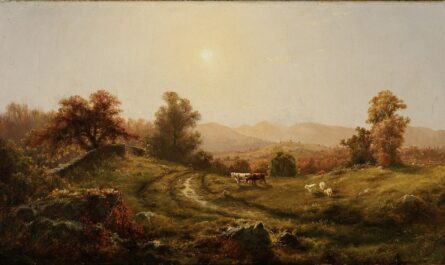The exultant Ralph Waldo Emerson, with his invigorating zest for life and pursuit of truth, delivered “The American Scholar” to the Phi Beta Kappa society in 1837 at Cambridge, Mass. In it, Emerson explores the role of said American Scholar in society. Emerson begins with a description of the “whole man”, which is divided in society by function; man Engineering, man Planting, etc. Each person’s job or role in society is only one part of the full expression of the whole man. The dedicated thinker then, when properly expressed, is the intellectual Man Thinking. When falling short of this ideal, however, he simply becomes a parrot of others’ thoughts.
Emerson then details the three schools which enrich the scholar; nature, the past, and action.
The first school man encounters is nature. As an enthusiastic and founding transcendentalist, Emerson’s love for nature jumps from the page. He describes how Nature’s laws are hidden, echoed in the disciplines of the sciences; in mathematics and chemistry alike. Consider this beautiful summation of nature echoing universal laws:
He shall see that nature is the opposite of the soul, answering to it part for part….So much of nature he is ignorant of, so much of his own mind he does not yet possess. And, in fine, the ancient precept, “Know thyself,” and the modern precept, “Study nature,” become at last one maxim.”

Photo by Chelsea Bock on Unsplash
The second school for the scholar is the past; histories of literature, art, and books especially. He describes the best way to learn from the past; books. Emerson observes society’s tendency to stand upon the celebrated works of the past as absolutes, rather than means of exploring further the world surrounding them.
“Books are written by thinkers, not by Man Thinking; by men of talent, that is, who start wrong, who set out from accepted dogmas, not from their own sight of principles. Meek young men grow up in libraries, believing it their duty to accept the views which Cicero, which Locke, which Bacon, have given; forgetful that Cicero, Locke, and Bacon were only young men in libraries when they wrote these books.”
Society – particularly colleges and institutions – prize the recitation of the words and theories of great men, rather than the innovative thinking inspired by and built from the same men. This is to “abuse” and not utilize books to their potential. Instead, universities should emphasize moving forward from a set of principles observed in the world to be true, gathering corresponding histories, and joining these together with the actions of living, thereby producing an ethos at all times observable, documented, and in daily practice.
“The book, the college, the school of art, the institution of any kind, stop with some past utterance of genius. This is good, say they, – let us hold by this. They pin me down. They look backward and not forward. But genius looks forward: the eyes of man are set in his forehead, not in his hindhead: man hopes: genius creates.”
The third school of learning for the scholar is action; the manifestation of the knowledge he has acquired.
“Action is with the scholar subordinate, but it is essential. Without it he is not yet man.”
As Napoleon Hill would echo decades later, knowledge is of little value until acted upon. Acquiring book knowledge is admirable work, but putting that knowledge to action in your doings is where the true value lies. What can implementing that knowledge secure or obtain for you? Indeed, for Emerson, the mere acquisition of knowledge is not the full expression of man; man’s full expression requires acting upon the truths and principles derived from one’s learning.
“Instantly we know whose words are loaded with life and whose are not.”
And again,
“Colleges and books only copy the language which the field and the work-yard made.”
The true worth of knowledge is expressed in the progress, function, creativity, solutions to be created by action in the “real world” for individuals and society alike. Words are not meant to merely exist within our brains, they are ideas; alive and intended to be acted upon. This is precisely why ideas are the most dangerous entities in existence; when implemented they create fundamental change, which manifests first in individuals, then permeates and diffuses through society.
After discussing the matter of education of the scholar, Emerson turns to the responsibilities of the scholar; “to cheer, to raise and to guide men by showing then facts amidst appearances.”
The scholar’s job then, is not to sit beside society contemplating the words of times gone by. It is to understand the wisdom found in history and implement it with his actions in life. The true scholar recognizes that life teaches lessons through action, as Emerson said,
“Time will teach him that the scholar loses no hour which the man lives.”

“Character is higher than intellect. Thinking is the function. Living is the functionary. The stream retreats to its source. A great soul will be strong to live, as well as strong to think.”
Emerson’s scholar is not the picture of an intellectual ill-equipped for living life. In fact, he is the contrary; a man who has considered what principles and laws govern his life, studied the wisdom of the greats, implemented such wisdom, and uses that combined knowledge to improve and progress society. Emerson prizes the individual full of integrity as an expression of scholarship.
Many times, especially in today’s realities of sky-high tuition costs and mounting student loan debt, the idea of the scholar or intellectual is dismissed as frivolous, uppity, or a retreating from society’s pressing issues. For Emerson, though, the scholar is the driving force of progress. He is to remind the rest of man what the great ideals and wisdom are, thus pulling man out of the filth, ever upward towards his, society’s, lofty ideals. His great responsibility is such:
“He is the world’s eye. He is the world’s heart. He is to resist the vulgar prosperity that retrogrades ever to barbarism, by preserving and communicating heroic sentiments, noble biographies, melodious verse, and the conclusions of history.”
The delightful Emerson asks more from scholars than mere memorization and recitation. He places the burden of driving society forward at the feet of those committed to studying the perspectives of the greatest minds in history. Who better to consult the future of society than those who have gleaned the most from the lessons of history?
*All quotes are from the 1985 edition of Penguin Classics “Selected Essays”
Editor’s Note:
In his discussion of the school of the past, Emerson touches on three periods of history marked by the philosophers; Ancient, Romantic, and modern, and offers his suggestion that they are expressed in the lifetimes of each of us; the Greek in the child, the Romantic in the youth, and the reflective Modern philosopher in adulthood.
Emerson’s lively descriptions of the scholar inspired me to look back at the schools of philosophy and conduct my own project. I want to look at the wisdom of the great minds from each of these three eras, and see what wisdom they can offer, specifically regarding relationships and our modern quandary called social media. I’m looking to history for universal truths to help guide our interactions and best practices today and in the foreseeable future. I’ll be posting my discoveries, beginning next week! Click here for all the posts in this series.




